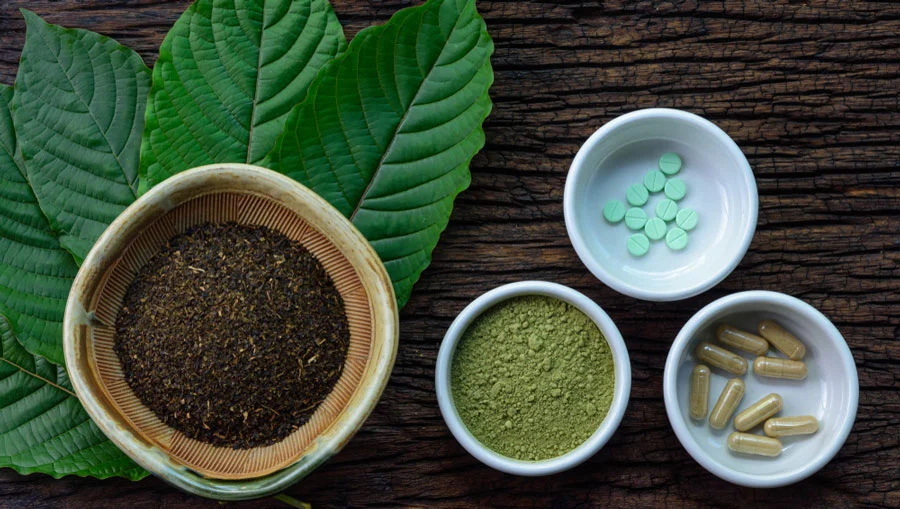Get Effective Support to Quit Kratom Safely at Catalina in Tucson
In 2019, the Centers for Disease Control (CDC) released a report on over 27,000 overdose deaths occurring from July 2016 to December 2017. A total of 151 of those deaths involved Kratom. Out of the 151 deaths where Kratom was found in the person’s system, it was the main cause of death for 91. Furthermore, 80% of the 91 individuals who died from taking Kratom had a history of substance abuse.
In many cases, kratom addiction starts with good intentions: People often use kratom to self-treat conditions such as opioid addiction, anxiety disorders, or depression. Especially since kratom is easily accessible, you may have started using kratom before you knew about the potential consequences of doing so — or how serious they can be.
Overall, kratom is much more dangerous than many would expect.
Kratom rehab and addiction treatment can help you break the cycle for good and get to where you want to be with the management of other disorders without sacrificing your health.
So, what should you know? This article will provide a comprehensive overview of Kratom addiction, how it can intersect with other addictions and mental health conditions, the risks and consequences associated with the substance, and how our substance abuse treatment programs at Catalina Behavioral Health in Arizona can help.
Get Effective Kratom Addiction Treatment at Catalina
Understanding Kratom Addiction
Kratom comes in several forms, including powders and pills. Since it is often sold at gas stations, people often assume it is harmless. However, the consequences of using the substance, which include serious adverse effects, withdrawal symptoms upon discontinuation, and addiction, deserve more attention and must be taken seriously.
According to the Substance Abuse and Mental Health Services Administration (SAMHSA), 1.7 million people in the United States aged 12+ used Kratom in 2021. Among the most affected were young adults aged 18-25 and individuals aged 26+, but anyone can abuse kratom or develop an addiction to it.
The symptoms of Kratom addiction may include but aren’t limited to the following:
- Needing to take more kratom than before to achieve desired effects (increased tolerance)
- Continuing to use Kratom despite problems at work, school, or other essential parts of life
- Continuing to use Kratom despite physical or mental health consequences
- Problems in interpersonal or familial relationships as a result of kratom use
- Physical or emotional withdrawal symptoms upon discontinuation
- Spending a significant portion of time under the influence of kratom
- Using kratom in dangerous or risky situations
- Trying to stop or reduce kratom use but failing to do so
Sometimes, those who have used other substances (e.g., those with opioid addiction) assume that using kratom is safer. However, the truth is that kratom is simply under-regulated. It is not recommended for anyone, let alone those who have a history of substance abuse.
What are the Typical Kratom Withdrawal Symptoms?

Discontinuation of kratom can come with withdrawal symptoms. This is yet another reason why it is not wise to use kratom to address withdrawals from other drugs. The most common kratom withdrawal timeline and symptoms can include but aren’t limited to the following.
- Extreme fatigue or lethargy
- Severe depression
- Anxiety
- Insomnia
- Sweating
- Shaking
- Nausea
Since withdrawal symptoms from kratom discontinuation are similar to those seen in people who stop using other drugs, it is another reason to avoid kratom use to address withdrawals or mental health concerns.
Drug Addiction and Kratom: Why Shouldn’t Kratom Be Used for Withdrawals?
Since Kratom is addictive and can come with other adverse health effects, it should not be used as a treatment for Opioid withdrawals or withdrawals from any other substance. Using Kratom is not worth the risk of addiction. If you have started using Kratom already and can’t stop, it is a sign of Kratom addiction. A kratom addiction treatment center like Catalina Behavioral Health can help.
It is critical to note that the Food and Drug Administration (FDA) has not approved kratom for the treatment of opioid withdrawal symptoms or other disorders, including anxiety, depression, and chronic pain. In fact, the Drug Enforcement Administration, or DEA, acknowledges the substance as a drug and chemical of concern.
24 Hour Substance Abuse Rehab Hotline
Kratom Recovery and Relapse Prevention
Sometimes, people who stop using Kratom due to addiction issues experience a relapse and start using the substance again. Relapse doesn’t have to be a part of recovery, but it can be. In this case, professional support is recommended.
When you seek treatment at Catalina Behavioral Health, we can help you address the underlying causes of your Kratom use, including dual-diagnosis disorders like anxiety that you may have attempted to address through Kratom use.
With proper treatment for addiction or mental health concerns, your quality of life, interpersonal relationships, and symptoms can improve. You’ll build a toolkit of healthy coping mechanisms and work toward a sober lifestyle that supports your overall physical and mental health with the help of our dedicated mental health professionals.
Our Kratom Addiction Treatment Options at Catalina

At Catalina Behavioral Health, we offer various levels of care so that you can choose the right addiction treatment program for your life and needs. Clients in all care levels at Catalina Behavioral Health receive an individualized and comprehensive treatment plan.
Your unique treatment plan will determine the schedule of group sessions and other activities you engage in while in treatment. When you first reach out regarding treatment for addiction, mental health, or dual-diagnosis disorders at Catalina Behavioral Health, we’ll provide a free intake assessment that’ll help our staff get to know you better.
Before you start treatment with us, we’ll help you decide on a starting level of care and discuss everything else kratom users and those overcoming an addiction to other substances need to know. For example, items to bring to treatment and items to leave at home (for those in inpatient care).
Former clients can participate in our alumni program, which allows those who have attended treatment at Catalina Behavioral Health to continue connecting with and checking in with staff.
Inpatient Kratom Rehab Programs
Residential treatment centers provide 24/7 support and supervision from medical professionals. With this level of supervision, you can’t act on temptations to use or access substances like Kratom, which is helpful for many people in addiction recovery.
Another benefit of inpatient treatment is that it provides room and board. So, if you’re coming to Catalina Behavioral Health for kratom rehab from a distance, you won’t have to worry about commuting to treatment each day.
In residential inpatient treatment at our addiction treatment center, you’ll be away from daily life triggers and stressors. You’ll be able to focus 100% on healing from Kratom dependence and addressing the underlying causes of Kratom addiction.
Catalina Behavioral Health’s inpatient rehab program consists of group therapy, individual therapy, life skills training, family therapy, psychoeducation, recreation activities, and other scheduled activities. Individual therapy sessions are held at least once weekly, whereas groups are held daily.
During our inpatient program, you’ll live on-site. Clients at our inpatient rehab center get access to comfortable rooms and a variety of amenities, such as outdoor spaces, fitness and yoga, games, and fresh, healthy meals.
Outpatient Kratom Rehab
Our outpatient programs may be ideal for treating Kratom addiction in two instances. First, some people transition into outpatient treatment after inpatient treatment to help them make the transition back into daily life. That way, you can practice the coping skills and other tools or strategies you learn in treatment and work through any possible challenges you come across with continued support from staff members.
Second, outpatient rehab can be an ideal starting level of care for those who need to work, go to school, or take care of their family while in treatment. The outpatient programs at Catalina Behavioral Health are flexible and able to accommodate working professionals. Outpatient treatment can also be ideal for individuals who have more minor symptoms of Kratom addiction and can manage cravings outside of treatment hours.
We offer multiple levels of outpatient care for Kratom addiction, including a partial hospitalization program (PHP), intensive outpatient program (IOP), and outpatient program. Each level of outpatient care offered for Kratom addiction at Catalina Behavioral Health comes with a different time commitment.
PHP is the most intensive care level, including group therapy sessions and other activities five days per week, whereas standard outpatient care is the least intensive. IOP is an in-between level of care that entails group therapy, individual therapy, and other treatments about three days per week, depending on your treatment plan.
Evidence-Based Therapies and Treatments for Kratom Addiction

Catalina Behavioral Health is a Joint-Commission accredited rehab center committed to close-knit, compassionate care. Our providers use a combination of evidence-based treatments and supportive holistic practices to address addiction and underlying issues. Treatments used at our treatment center include but aren’t limited to:
- Behavioral therapies, like cognitive behavioral therapy (CBT)
- Motivational therapies, like motivational enhancement therapy (MET)
- FDA-approved medication-assisted treatment (MAT) for addiction
- Medication management
- Mindfulness and meditation
- Experiential therapies
- Family therapy
- Psychoeducation
- Trauma therapy
Before you graduate from your treatment program at Catalina Behavioral Health, we’ll help you make a post-treatment or aftercare plan that’ll help you sustain a successful recovery. For example, continued therapy, outpatient care (for those leaving residential treatment), ongoing medication management, and other services.
Get Effective Kratom Detox and Rehab Options
The Most Well Known Kratom Risks for Your Health
The bottom line regarding kratom usage is that it’s unsafe and ineffective. What are the main risks someone using or considering kratom should look out for? Here’s an overview and some final considerations.
A Recognized Potential for Addiction
As discussed, kratom isn’t recommended for those with an existing substance use disorder or anyone else. Kratom dependency can impact anyone and can lead to a substance abuse problem or physical addiction requiring treatment, no matter who you are.
Mounting Physical and Mental Health Effects
At low doses, people who use Kratom may experience effects such as increased energy, alertness, and talkativeness. However, people can also experience a range of side effects from using Kratom. Physical and mental health effects of Kratom can include but aren’t limited to the following.
- Severe withdrawal symptoms
- New or worsened mental health challenges
- Weight loss
- Respiratory depression
- Hallucinations
- Seizures
- Insomnia
- Drowsiness
- Irregular heartbeat
- Increased urination
- Itching
- Sweating
- Constipation
- Dry mouth
With kratom dependence and other side effects in mind, using kratom is not worth the potential consequences. Other serious consequences can include but aren’t limited to liver and heart damage.
A Complete Lack of Regulation
Even though we have research to support the potentially fatal nature of kratom leaves and derivatives, kratom is severely under-regulated. There are better, safer alternative treatments for the concerns people often use kratom to navigate. Addiction treatment centers like Catalina Behavioral Health that take a holistic approach can help you find solutions.
Call Catalina Behavioral Health for Kratom Rehab Today

If you’re looking for a Kratom addiction treatment program in Arizona, Catalina Behavioral Health can help. Catalina Behavioral Health offers residential treatment and various levels of outpatient care for those recovering from kratom abuse. We can also help with co-occurring disorders and related concerns.
To contact Catalina Behavioral Health, call the admissions line on our website today. The friendly admissions team at our rehab center is available 24/7 to verify your health insurance coverage, discuss treatment methods, and provide answers to any lingering questions.
All calls are 100% confidential, so please reach out for our support today!
Up To 100% of Rehab Costs Covered By Insurance
FAQs Regarding Kratom Rehab and Addiction Treatment
Who is at risk of Kratom addiction?
People who have a history of other substance use disorders, like Opioid Use Disorder (OUD), can be at a higher risk of Kratom addiction. Not only does kratom interact with opioid receptors, but kratom abuse sometimes starts with an attempt to address opioid withdrawal.
Another group of people who could be at a higher risk of kratom abuse or physical dependence are those attempting to self-medicate concerns like anxiety or depression through using kratom alongside alcohol or cannabis. Kratom dependence is often seen in young adults.
If you or someone you know experiences the signs of kratom addiction, seeking treatment is integral. Our team of licensed medical professionals and mental health providers can help.
What does Kratom withdrawal feel like?
Kratom withdrawals differ from person to person but come with symptoms similar to withdrawals from other drugs. Common symptoms of kratom withdrawal can include but aren’t limited to extreme tiredness, severe depression, anxiety, trembling, restlessness, shaking, trouble sleeping, nausea, stomach upset, and other gastrointestinal effects.
Is Kratom approved by the FDA?

No. Kratom is not approved by the FDA to treat any condition. When you seek treatment for kratom abuse at Catalina Behavioral Health, we’ll help you work through potential underlying causes of kratom use, abuse, addiction, or dependence.
Does Kratom detox need to be supervised?
Sometimes, medically assisted detox can be an important precursor to addiction treatment, specifically if you have not yet stopped taking kratom and are at risk of withdrawal. We offer sub-acute kratom detox services to help you through the initial withdrawal symptoms you experience when you stop taking kratom.
How long does Kratom detox take?
Most clients only spend about a week or less in medical detox, which is when the acute withdrawal process takes place.
Once the initial symptoms of kratom withdrawal are over, you can transition into a treatment program at Catalina Behavioral Health, where you’ll address the underlying causes of Kratom abuse, build a strong set of coping skills, and focus on building a new, substance-free life.
References
- https://www.cdc.gov/mmwr/volumes/68/wr/mm6814a2.htm
- https://www.dea.gov/sites/default/files/2020-06/Kratom-2020_0.pdf
- https://www.fda.gov/news-events/public-health-focus/fda-and-kratom
- https://www.samhsa.gov/data/sites/default/files/reports/rpt39443/2021NSDUHFFRRev010323.pdf
- https://www.ncbi.nlm.nih.gov/pmc/articles/PMC9616552/
- https://www.dea.gov/factsheets/kratom





